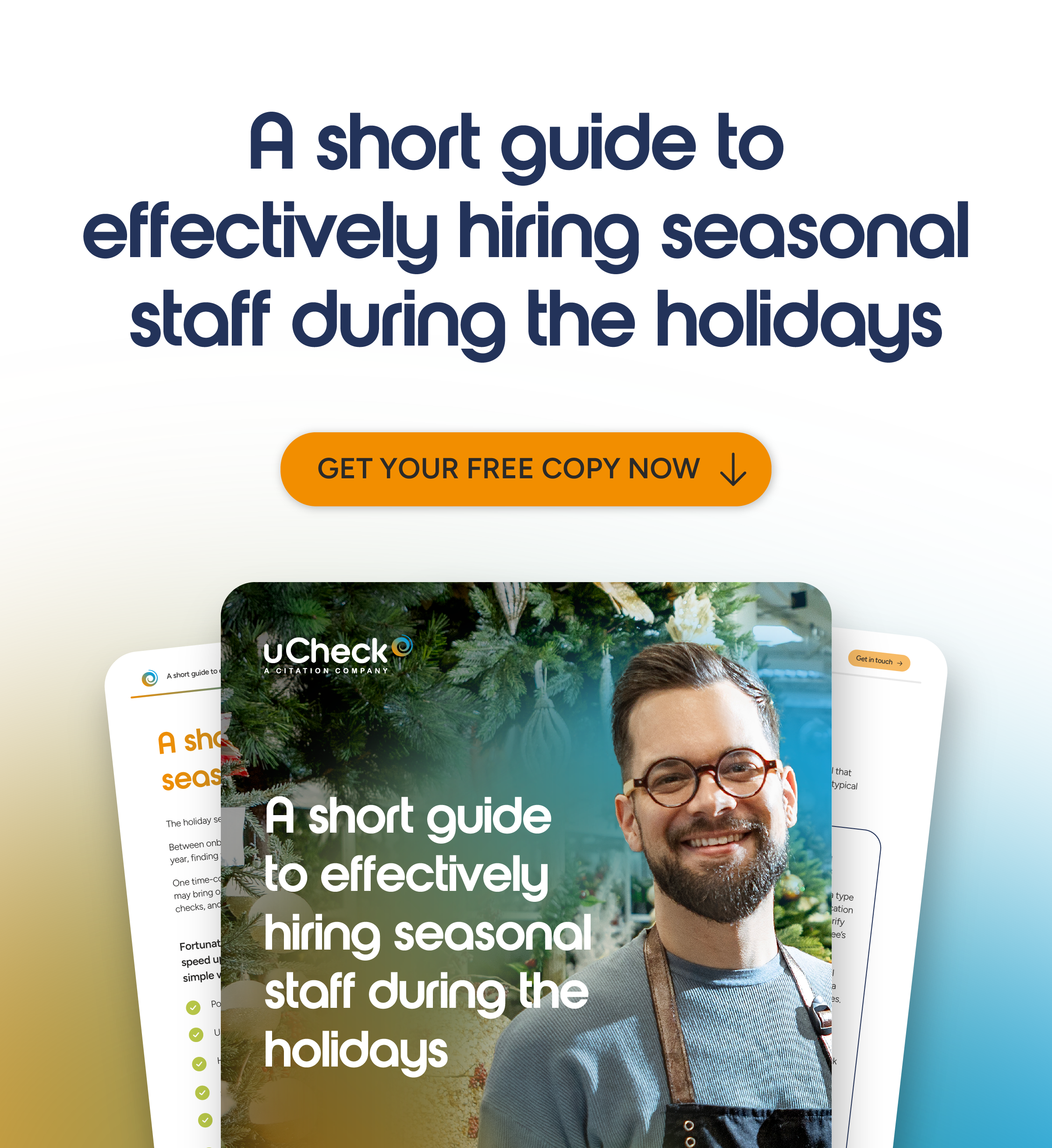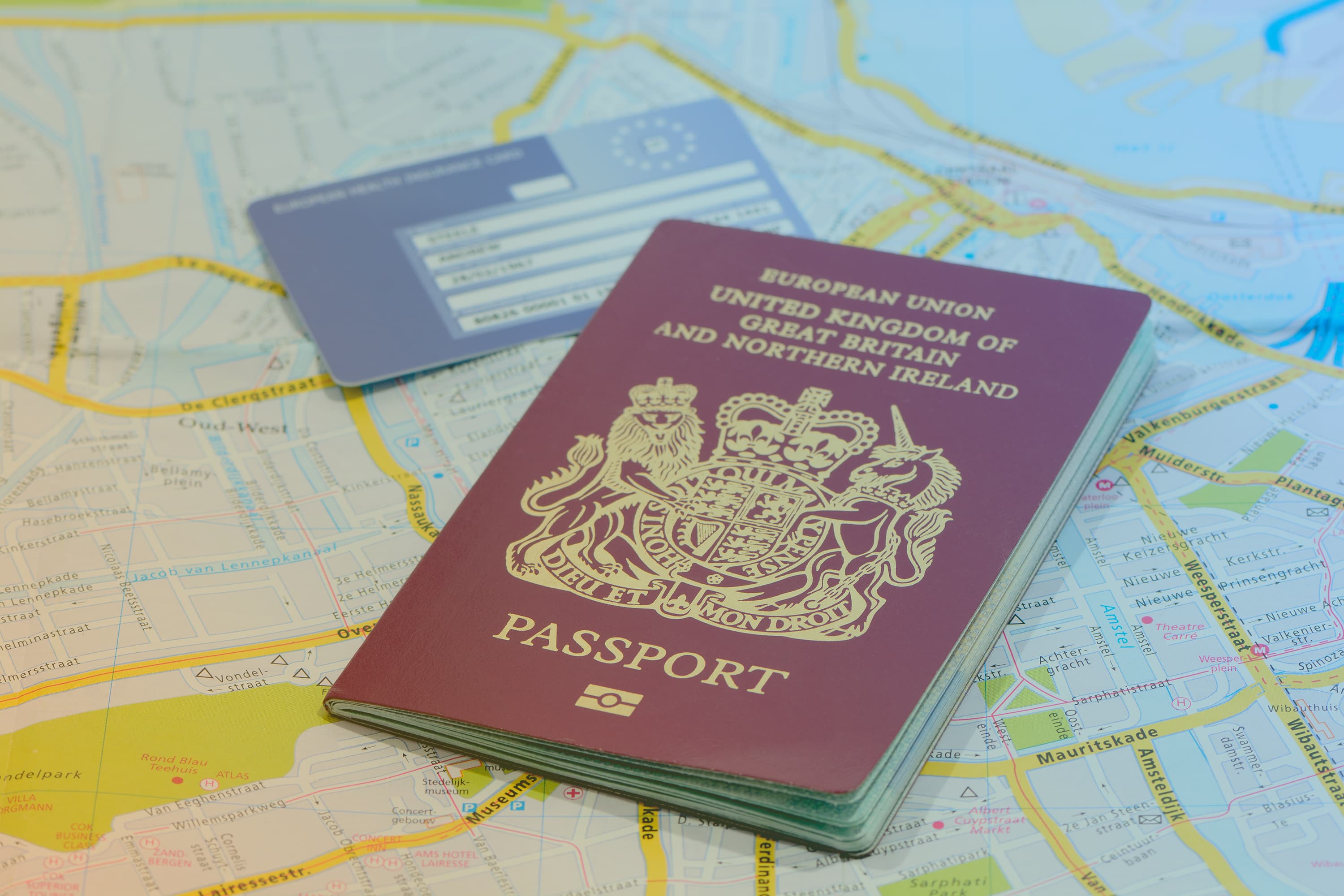When applying for a role requiring a Disclosure and Barring Service (DBS) check, it’s normal to wonder what might show up, especially if you’ve received a caution or conviction in the past for something considered minor.
At uCheck, we regularly help employers and applicants navigate this area with confidence and clarity. This guide explains what cautions and convictions appear on DBS checks, how the filtering process works, and where to seek advice if you’re unsure about your situation.
What shows up on a DBS check?
Before looking at specific cautions or convictions, it’s essential to understand what a DBS check can reveal. The information disclosed depends on the level of DBS check being carried out.
There are three main types of DBS checks in England and Wales, each offering a different level of detail.
Basic DBS check
A Basic DBS check is the most straightforward level of criminal record check available. It’s often used when a more detailed level of vetting isn’t required, but some level of background assurance is still needed. Both individuals and employers can request this type of check. A basic DBS check will show:
- Any unspent convictions – criminal offences that are still considered active under the Rehabilitation of Offenders Act, and must be disclosed.
- Any unspent conditional cautions – formal warnings given by the police that include specific conditions, such as attending a rehabilitation programme or paying compensation.
This type of check is typically used for roles that do not involve working with vulnerable groups or for personal licensing and visa purposes.
Standard DBS check
A Standard DBS check goes a step further and is usually required for roles involving a higher level of responsibility or trust, such as solicitors, accountants, and some civil service posts.
It provides more detailed information than a Basic check and is typically used for regulated professions or positions where adherence to ethical and legal standards is key. It shows:
- Spent and unspent convictions – criminal convictions that are either still active (unspent) or considered spent, but still relevant to the role.
- Cautions – formal warnings given by the police for less serious offences that don’t go to court.
- Reprimands – now replaced by youth cautions, these were given to young people (under 18) for minor offences.
- Warnings – also replaced by youth cautions, these were issued to under-18s as a less formal response to minor criminal behaviour.
Standard checks help employers assess applicants’ suitability for roles where integrity and compliance are especially important.
Enhanced DBS check
An Enhanced DBS check is the most comprehensive level of disclosure and is used for roles involving close contact with children or vulnerable adults, such as in healthcare, teaching, or social care. It will show:
- Everything that’s included in a Standard check, such as spent and unspent convictions, cautions, reprimands and warnings.
- Any additional relevant information held by local police if considered important to the role. This could include relevant information on investigations that did not lead to a conviction or caution, or any fixed penalty notices (FPNs).
This police information is provided at the discretion of the Chief Officer and may include details of investigations or allegations, even if they did not result in a conviction.
Will all offences appear on a DBS check?
Not all cautions or convictions will be disclosed. In 2013, the DBS introduced a filtering process to prevent old or minor offences from appearing on their certificates. These are referred to as protected offences.
A filtered offence will not be shown on a DBS certificate and must not be disclosed by the applicant. However, it’s important to note:
- Filtered offences remain on police records.
- Employers are not permitted to ask about them.
- Certain offences, such as those involving violence, safeguarding, or sexual offences, can never be filtered.
Understanding what each level of DBS check includes is a key step for employers and individuals when assessing risk and eligibility.
What are filtered cautions and convictions?
The DBS filtering process prevents minor, old, or irrelevant offences from unnecessarily affecting employment opportunities.
This process runs automatically when a DBS check is submitted and works similarly to the rehabilitation periods set out in the Rehabilitation of Offenders Act 1974. Offences that meet certain criteria are filtered out, meaning they won’t be disclosed to the employer on the certificate.
However, it’s important to highlight:
- Filtered offences are not deleted from police records
- Applicants are not legally required to disclose filtered offences
- Employers must not ask about filtered cautions or convictions during recruitment
As an employer, it’s therefore important to be aware of the rights of any candidates you choose to screen.
Which cautions and convictions are eligible for filtering?
Not every offence will show up on a DBS check — some cautions and convictions are considered “protected” and may be filtered from the certificate under certain conditions.
What types of offences can be filtered?
Examples of offences that may be eligible for filtering include:
- Being drunk and disorderly
- Common assault (not involving intent to cause serious harm)
- Drug possession offences (not supply or intent to supply)
- Motoring offences such as minor speeding or driving without insurance
- Theft (provided there was no violence or aggravating factor)
Each caution or conviction is assessed individually against strict criteria. More than one caution can be filtered, as long as each offence meets the filtering rules.
What are the filtering timeframes?
Not all offences stay on a criminal record forever. In some cases, certain cautions and convictions will no longer appear on a DBS certificate after a set period of time. This helps make sure that old or minor offences don’t unfairly impact someone’s job prospects, particularly if they’ve stayed out of trouble since.
The length of time before an offence can be filtered depends on the applicant’s age at the time of the offence:
- Cautions
- 2 years for those under 18
- 6 years for adults (18 and over)
- Convictions
- 5.5 years for those under 18
- 11 years for adults
Convictions must meet all of the following criteria to be eligible for filtering:
- It was a single conviction (multiple convictions aren’t eligible).
- It didn’t result in a custodial sentence.
- It’s not on the DBS list of offences that are excluded from filtering.
What offences can never be filtered?
Certain offences are always disclosed on Standard and Enhanced DBS checks, regardless of how much time has passed. These include:
- Safeguarding offences
- Sexual offences
- Violent offences
- Drug offences involving supply or intent to supply
- Offences that resulted in a prison sentence
These are considered serious enough to remain relevant to employers making safeguarding or high-trust hiring decisions.
The rules around filtering are complex and subject to periodic review. The lists above are for guidance only and don’t cover every possible offence.
For a full breakdown of eligible and excluded offences, including the official list of non-filterable offences, you can refer to the official DBS filtering guidance on GOV.UK.
Understanding these filtering rules ensures that employers remain compliant with the law and applicants aren’t unfairly disadvantaged by old or minor offences.
Common misunderstandings about filtering
The DBS filtering process can often cause confusion, especially for individuals unfamiliar with how their criminal record is handled during recruitment. Both candidates and employers can misunderstand what filtering does and doesn’t mean.
Below are some common misconceptions, which we’ve done our best to clarify for you:
1. Filtered offences still exist — they’re just not disclosed
A key point to remember is that filtering does not erase cautions or convictions from police records. The information remains on file but is withheld from the DBS certificate when certain conditions are met.
This means:
- Employers won’t see filtered offences on the certificate.
- Applicants aren’t legally required to disclose filtered offences, even if asked.
2. Employers can’t ask about filtered offences
Under the Rehabilitation of Offenders Act 1974 and the Police Act 1997, employers must not ask applicants to reveal any offences that have been filtered. Doing so may be considered a breach of data protection and privacy laws.
This applies even if the applicant volunteers information out of uncertainty; employers should be aware of their legal obligations to disregard it.
3. Not all offences are eligible for filtering
As we highlighted above, some offences are considered too serious to be eligible for filtering.
If a caution or conviction falls under one of these categories, it’ll always appear on a Standard or Enhanced DBS check, regardless of how much time has passed.
4. Filtering depends on specific criteria
Even for offences that are eligible for filtering, the following conditions must be met:
- A certain number of years must have passed since the date of the offence.
- The person must not have more than one conviction.
- The offence must not be on the list of exempted offences.
The filtering periods are:
- Cautions: 6 years for adults, 2 years for those under 18
- Convictions: 11 years for adults, 5.5 years for those under 18
Understanding these details helps both employers and applicants navigate the DBS process with confidence and fairness. It also supports safer recruitment by focusing only on relevant and legally disclosable information.
Need help with DBS checks?
Whether you’re an employer carrying out DBS checks or an individual looking for guidance, uCheck is here to help!
We’re trusted by thousands of organisations across the UK to deliver fast, accurate, and compliant checks, all with expert support. Get your DBS check completed online, with an average completion time of only 48 hours!
Get in touch with our team today to start your DBS check or find out more.
Where to get advice on cautions and convictions:
If you’re uncertain about what may appear on your DBS certificate or how to approach disclosure, these expert services are here to help:
- Unlock – A charity supporting people with criminal records: www.unlock.org.uk
- NACRO – Offers guidance for individuals and employers: 0300 123 1999
- Disclosure and Barring Service (DBS) – Official support line: 03000 200 190
These organisations can provide tailored advice and clarity based on your circumstances.







